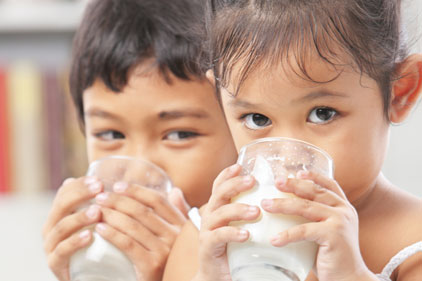When researchers looked at daily milk intake as it related to iron and vitamin D levels in about 1,300 preschoolers, they found that drinking 2 cups of milk a day seemed optimal for most children, says lead researcher and pediatrician Jonathon L. Maguire, MD, of St. Michael’s Hospital in Toronto.
Vitamin D and iron are important nutrients for growing children. Iron plays a critical role in brain development. Iron deficiency has been linked to problems in movement. Vitamin D is important for many reasons, including bone health.
Milk is one of the best sources of vitamin D and calcium, while iron-fortified cereals and meats are among the best sources of iron.
Drinking 3 cups or more of milk was associated with slightly lower ferritin levels in the blood, but the levels were still within the normal range for most children. Ferritin levels indicate how much iron is stored in the body.
The more milk the children drank, the lower their ferritin levels tended to be.
“Milk is an important source of nutrition for young children, but the message to parents is that too much of a good thing may come with a trade-off,” Maguire says.
Though parents of preschoolers often ask how much milk their young children should be drinking, Maguire says the answer is not that clear.
He points out that the American Academy of Pediatrics recommends limiting cow’s milk to about 2 cups a day for preschoolers, but the group’s committee on nutrition also calls for vitamin D supplements for children who drink less than about 4 cups a day (1,000 mL).
It is not clear if drinking milk directly blocks iron absorption or if its impact is less direct.
“Cow's milk doesn’t have much iron, and it may be that kids who drink a lot of it are not eating other foods that are rich sources of iron,” Maguire says. “We really don’t know.”
In the study, published in the journal Pediatrics, each 8oz. cup of milk a child drank was associated with a 3.5% drop in ferritin levels.
“That may not sound like a lot, but it can add up, especially in children with other risk factors for iron deficiency,” Maguire says.
The researchers noted that vitamin D supplements may be important for darker-skinned children or for children who get little vitamin D from the sun. The body makes vitamin D when exposed to sunlight.
Pediatrician Steven Abrams, MD, a member of the AAP committee on nutrition, says parents shouldn’t stress too much about exactly how much of a certain food their child eats, as long as the child is eating a variety of healthy foods.
“Most of the children in this study who drank a lot of milk were not iron deficient,” he says. “The effect of milk on iron status was pretty small.”
In a statement addressing the study, the National Dairy Council pointed out that it is not clear if drinking milk has a direct impact on iron levels.
“This study supports the role and importance of milk in helping children meet their nutrient needs, specifically vitamin D, when following recommended guidelines for milk consumption,” the statement reads.
